- Evil Woman/Wicked World (Fontana TF 1067) 1970
- Paranoid/The Wizard (Vertigo 6059 010) 1970
- Black Sabbath (Vertigo V06) 1970
- Paranoid (Vertigo 6360 011) 1970
Black Sabbath
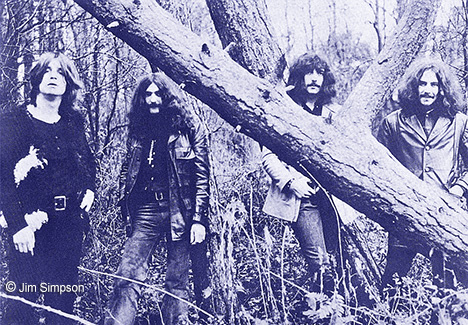
ASTON BIRMINGHAM
Updated November 2024
Terry "Geezer" Butler bass guitar
Tony Iommi guitar, piano, mellotron
John "Ozzy" Osbourne lead vocal, harmonica
Bill Ward drums, vocal
This influential Birmingham group are regarded as the major originators of what became known as 'Heavy Metal', a style of music that typically includes a combination of doom-laden lyrics and distortion-heavy guitar riffs, all played at a volume previously unknown to those other than jet aircraft mechanics!
While Black Sabbath's first ground-breaking album wasn't released until 1970, the origins of the group can be traced back to the early 1960s Birmingham beat scene with their musical roots coming directly from jazz, R&B and blues along with the psychedelic influences that followed later in the decade.
"You're either going to do something very special, or you're going to go to prison. And he was right, my old man. I was in prison before my eighteenth birthday"
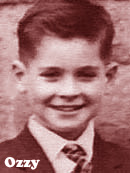
John Michael Osbourne was born on December 3rd 1948 at 14 Lodge Road in Aston, Birmingham. He grew up in what was (and still is today) one of the roughest areas of Birmingham. The Osbournes were just one of many similar families living in that area, struggling to get by on a limited income.
As one of six kids living in the two bedroom house, the young Osbourne's early years were tough if not traumatic. John's mom worked at the Lucas factory making car parts, while his father worked shifts as a skilled machine tool operator and ruled the rather crowded Osbourne household with an iron hand.
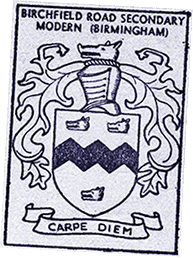
John Osbourne was a pupil at Birchfield Road Secondary Modern School in Perry Barr. While known as a rebel at school and not well regarded by his teachers, he showed some enthusiasm and talent for acting and singing in the school plays. Unfortunately, this led to teasing by his classmates who called him names like "Ozz-brain" in reference to his last name - this ultimately becoming "Ozzy" by which he is known to this day. Ironically, one of his playground tormentors at the school was a boy named Anthony Iommi who would one day play a huge part in the development of Ozzy's subsequent career.
Years later, Ozzy recalled; "My father always said I would do something big one day. He'd tell me after he'd had a few beers; 'John Michael Osbourne. You're either going to do something very special, or you're going to go to prison'. And he was right, my old man. I was in prison before my eighteenth birthday."
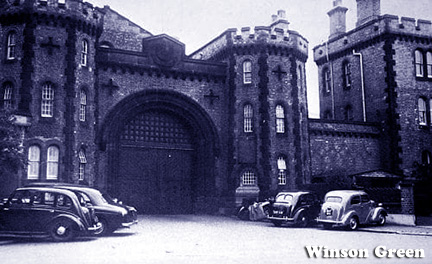
Ozzy Osbourne left school at age 15 and having no money, took a series of jobs - none of which he liked for very long - that included plumber's apprentice, factory work, and even slaughtering animals for a butcher in Digbeth. Seeking to improve his meagre income, he soon ended up in trouble with the police after getting caught while breaking into and robbing a shop.
Ozzy was charged with burglary and when his father refused to pay the fine, was sent to Birmingham's infamous Winson Green Prison for three awful months. After release, he was soon in trouble again and charged with assault following a drunken escapade at a local pub. This time, he paid the fine and resolved never to go back to prison again. One of the few positive influences in Ozzy's life during the mid 1960s was listening to The Beatles on the radio and thinking he would like to become a professional singer in a band.
"If ever the devil was born without a pair of horns, it was you Jezebel, it was you"
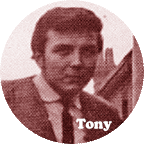
Anthony (Tony) Iommi was born February 19, 1948 of Italian parents and lived on Park Lane in Aston Birmingham. He went to the same school as Ozzy Osbourne but although the two knew each other, they did not get along well at all. Being musically inclined, the accordion was the first instrument that Tony learned to play at which he became quite skilled. His interest changed to guitar after hearing Cliff Richard's backing group "The Shadows" and their guitarist Hank Marvin became Tony's biggest influence.
Tony's school friend Albert Chapman wanted to be a singer so he and Tony started practicing in the front room of Albert's house. Tony said; "We must have been twelve or thirteen years old. We only knew one song which we played over and over which was 'Jezebel' by Frankie Laine. Albert used to wail: If ever the devil was born without a pair of horns, it was you Jezebel, it was you".
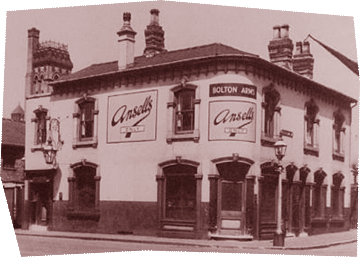
Tony's first electric guitar was a left-handed "Watkins Rapier" with a Watkins Westminster amplifier that his mom paid about 20 pounds for. By 1963 while still in school, Tony was playing his guitar in local pubs with a band of much older musicians. Like many of his friends, Tony Iommi took on a factory job after leaving school but did not give up the dream of one day "turning pro" with his own group.
Tony Iommi's first 'professional' group was called "The Rockin' Chevrolets" (see The Rockin' Chevrolets) with the other members being vocalist Neil Cassin, guitarist Alan Meredith, drummer Pat Pegg, and bass guitarist Dave Wadley. The Rockin' Chevrolets played every week at the Bolton Arms pub in Small Heath and were soon getting many other bookings.
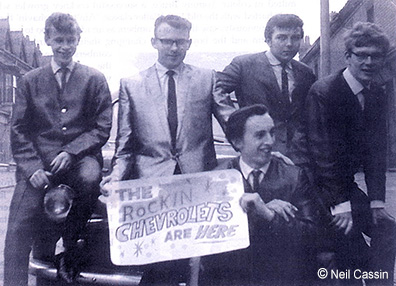
Tony Iommi's talent as a guitarist was clearly evident even in those days as the audiences went wild when he played brilliant renditions of instrumental numbers by groups such as The Shadows and The Dakotas. Tony stayed with The Rockin' Chevrolets for about two years until they disbanded. The next group he joined was called "The Birds and Bees" who were offered work over in Germany.
Thinking this would be his "big break", Tony Iommi decided to quit his factory job and go full-time with the band. Then - disaster struck. On his last day at work, Tony had an accident in which the ends of two fingers on his right hand were sliced off by the machine he was operating. Being left handed, this awful incident could easily have finished his career as a guitarist and at the time, he thought he would never play again.
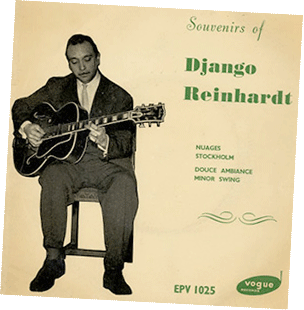
One of Tony's friends gave him a record by Django Reinhardt, a world-famous jazz guitarist who when a teenager, had lost some fingers after being burned in a fire. Finding inspiration from the record, Tony Iommi resolved to play guitar again and initially tried wearing sewing thimbles on his injured fingers, and then made his own plastic & leather caps so he could press on the strings. Eventually, through pain and great effort, he was once again playing guitar.
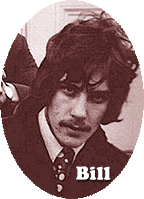
William (Bill) Ward was born in Aston, Birmingham on May 5, 1948 and lived on Witton Lodge Road. He learned to play drums at an early age and by the time he was a teenager was playing in a group at school. Bill Ward was influenced by the great jazz drummers of the time such as Buddy Rich and especially Gene Krupa.
Bill said; "I was playing drums when I was very, very young. I was probably about three or four years old at the time. The music I listened to was the Big Band music and Swing that my mother and father listened to a lot. Also The Platters and The Ink Spots and then moving on to rock 'n' roll with Elvis Presley, Little Richard, and Jerry Lee Lewis."
Bill started a band called "The Rest" with some friends and continued with them after leaving school. In addition to playing drums, Bill was also lead singer in The Rest. As was the case with many young groups, members came and went but when their lead guitarist decided to leave it was Tony Iommi who filled the position in 1966.
"You had to play that poppy stuff or else you wouldn't get a gig"
By this time, the other members of The Rest consisted of Michael Pountney on bass guitar, Mick Radford on rhythm guitar, and Chris Smith who took over Bill Ward's job as their lead vocalist. Tony Iommi remembered; "We did a lot of covers - some Shadows, some Beatles, maybe some Stones - more or less Top 20 stuff. You had to play that poppy stuff or else you wouldn't get a gig". While "The Rest" appeared similar to many of the beat groups active in and around Birmingham at that time, there was little indication as to the musical direction that two of the members would eventually follow.
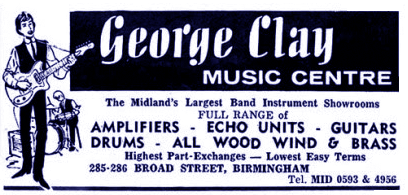
Meanwhile, Ozzy Osbourne had decided to pursue his ambition of becoming a singer and in early 1967 joined a new group called "The Music Machine" who had not yet played any gigs and were led by a character named "Mickey Breeze". Jeff Hibbard was their guitarist and he remembers going on the bus into town with Ozzy Osbourne to George Clays music shop on Broad Street. Jeff bought a Vox Conquerer guitar amplifier while Ozzy purchased a set of Vox P.A. speakers along with a microphone and stand from a down-payment he had persuaded his father to give him.
The Music Machine was re-named "The Approach" and rehearsed in an Aston church cellar where they played R&B covers like 'Knock On Wood' and 'Midnight Hour', sometimes in front of a small audience of friends. Jeff Hibbard recalled; "The place had a concrete floor and ceiling and square supporting columns with a wider square at the bottom which would serve as seats. It was winter and there was no heating in there. Some nights I could hardly play because my fingers were so cold. Ozzy's breath was freezing as it left his mouth!
Ozzy Osbourne said; "I'd sing in this high-pitched voice as the others tried to remember the chords to some hokey cover version. I used to joke that you could tell I'd worked at a slaughterhouse cos I did such a good job at slaughtering songs!" Unfortunately, Ozzy didn't get along with other members of the group and left after a few months before the band could play any bookings.
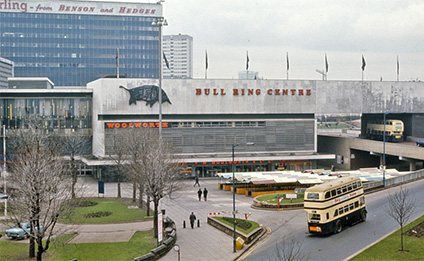
Ozzy Osbourne decided to post an advertisement on the board in Ringway Music, a shop located in The Bull Ring Centre, Birmingham. Ozzy wrote "OZZY ZIG - VOCALIST - LOOKING FOR A BAND - OWNS OWN P.A."
This ad attracted the attention of an amateur group called "Rare Breed" who needed a replacement vocalist and so enlisted Ozzy. The band had been put together by guitarists Roger Hope and Terence Butler who lived close to Ozzy's house. The line-up had formed in 1966 and were at first called "The Ruums" The other band members were Tony Markham (drums), and Mick Hill (bass).
"We all used to go on with painted faces and do this stupid psychedelic show"
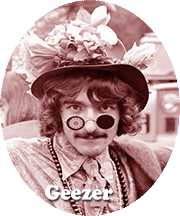
Terence Michael "Geezer" Butler was born into a large Irish Catholic family on July 17, 1949 in Birmingham. He grew up at 88 Victoria Road in Aston and became known as "Geezer" from an early age. A lifelong "Aston Villa" supporter, he became a Beatles fan and started playing guitar at around the time he left Holte Grammar School - learning rhythm guitar for about six months before becoming a member of "The Ruums" who became Rare Breed.
Geezer Butler recalled; "We were a bit loony. It was psychedelic stuff. We all used to go on with painted faces and do this stupid psychedelic show. We never used to get asked back to anywhere that we played, so I think we were probably really crap." The Rare Breed actually played a few gigs after Ozzy joined before disbanding as some of the other members didn't want to give up their day jobs and go at it full-time.
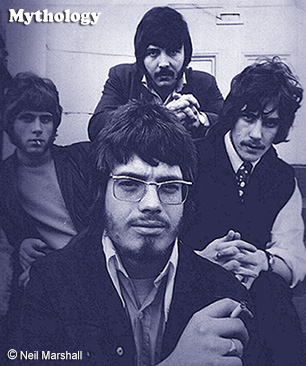
By early 1968, Tony Iommi had left The Rest after successfully auditioning as guitarist for a Carlisle-based group called "Mythology" who had plenty of bookings. Chris Smith from The Rest also became the group's new vocalist. They were soon joined by drummer Bill Ward whom Tony had recommended to Mythology's bass guitarist Neil Marshall and so in this way, "The Rest" literally became the new "Mythology".
Tony Iommi had by this time, developed a more blues-based guitar playing style that had a strong Jimi Hendrix influence with the band playing heavier sounding music including material by groups such as "The Yardbirds" and "Cream". Mythology didn't attract much interest from the record companies but were well-known around Carlisle where the band lived together in the same flat.
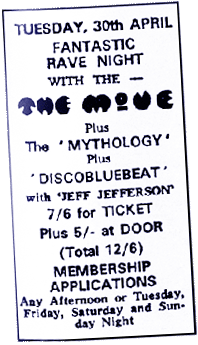
Unfortunately, this flat was eventually raided by the police who found a large quantity of illegal drugs there. The band were promptly arrested and a scandal erupted when the bust was reported in the newspapers. Although the group did "occasionally" smoke some hashish, their dealer had left a suitcase full of the stuff in the flat for safekeeping. They got off lightly. Following a good grilling by the police, the band were released but the incident had a sobering effect on Tony Iommi.
Tony Iommi; "It made the national news and also reached Birmingham so my parents found out. Imagine the neighbours saying: 'That Iommi boy is a drug addict!' The drug fiasco was the main reason Mythology broke up. Getting gigs became difficult so me and Bill just came back to Birmingham. I had to live at home again. It was embarrassing but I had nowhere else to go."
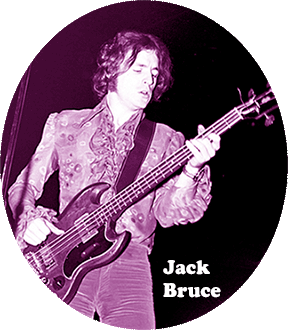
Tony Iommi and Bill Ward decided to form a new blues-based group. Tony and Bill both knew Geezer Butler who lived close by so invited him to play bass guitar. As Geezer could not afford to buy a bass guitar, he tried solving this problem temporarily by tuning down the strings on his electric guitar.
Geezer said; "I'd never even thought about bass! I looked over at Tony and played the root of whatever chord he was playing. I saw Cream three times when they played in Birmingham. I then just spent my whole time listening to Jack Bruce and practicing bass". He soon swapped his Fender Telecaster guitar for a sturdy second-hand Fender Precision bass.
It was Geezer Butler who said they should try his former bandmate Ozzy Osbourne from the defunct Rare Breed as vocalist. Tony was dismayed to find it was the same Ozzy he had picked-on in school and was at first reluctant about having him in the group. To make matters worse, Ozzy had also decided to become a "skinhead" and had shaved off all his hair! Despite this and with the addition of saxophonist Alan Clarke and guitarist Jim Phillips, the new line-up started rehearsing and was named "The Polka Tulk Blues Band".
"I could see there was some potential"
After a short time and just a few gigs it became apparent the Polka Tulk line-up was not working out. Tony's heavy blues style of playing left little room for a second guitarist and the saxophone just did not fit the new format. The band broke up but re-formed a short time later as a four-piece under the new name of "Earth". The group now consisted of Tony Iommi, Ozzy Osbourne, Geezer Butler, and Bill Ward.
Even at this stage, Tony Iommi had doubts about the line-up. He recalled; "Those first gigs were crap. This band was not nearly as good as Mythology but I said give it time and it will be alright. I could see that there was some potential".
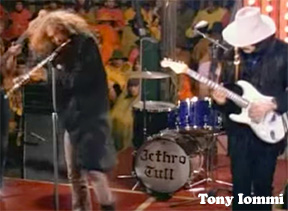
Out of the blue, Tony Iommi's "big break" suddenly came when he was asked to audition for up-and-coming folk-rock group "Jethro Tull". Ozzy, Bill, and Geezer (to their credit) encouraged Tony to go down to London and although nervous, he was selected from dozens of other guitarists by front-man Ian Anderson who offered him the job!
However, Tony disliked their management and only stayed with Jethro Tull for a couple of weeks - just long enough to appear on the Rolling Stones legendary "Rock & Roll Circus" film before deciding to go back to Birmingham and continue with Earth. Tony recalled years later that his experience with Jethro Tull made him realize the importance of regular disciplined rehearsals.
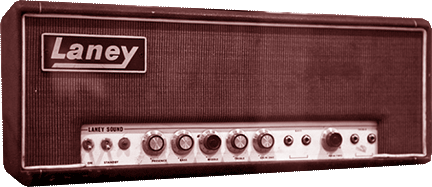
By 1969, new groups like "Deep Purple" and "Led Zeppelin" were attracting a lot of attention from both the music press and the public. This was partly due to the loud volume generated on-stage by these bands and "Earth" certainly gained a reputation early on for their loud performances.
Tony Iommi started using the locally made Laney LA100BL guitar amplifiers, designed and built by former Band of Joy bass guitarist Lyndon Laney. However, difficulties for the group were encountered in securing bookings as most of the pubs and clubs in Birmingham at that time still catered to a pop audience.
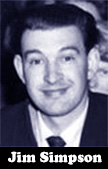
Jim Simpson was a well known jazz musician and band manager in Birmingham. He was manager and trumpet player of the pop group Locomotive who had a minor hit record in 1968 with 'Rudi's In Love' and also worked as photographer for the Midland Beat newspaper. Jim had opened a new club in Birmingham at the corner of Hill Street and Station Street called "Henry's Blues House".
Led Zeppelin were one of the first bands to play at Henry's so thinking this might be a good opportunity, the members of Earth approached Jim Simpson to see if they could perform there too. Jim was at that time managing local bands Bakerloo Blues Line and Tea & Symphony as part of his "Big Bear Follies" promotions company.
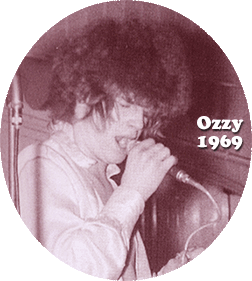
It was obvious that Earth needed a manager who understood their music so Jim Simpson allowed them to open for the well-known band "Ten Years After" at his club. The audience response to Earth's performance on that night was favourable so Simpson also agreed to manage them.
Jim Simpson sent the group over to Germany for the first of their three visits to the legendary "Star-Club" in Hamburg where many British bands including The Beatles had performed before they made the big time. Earth had to play several 45 minute shows per day and although much of it consisted of extended blues jams and embryonic versions of original songs that would make them famous, the German audiences loved it. On one occasion performing there, Ozzy found a can of purple paint that he applied to his upper body including his nose. It took weeks to wash off!
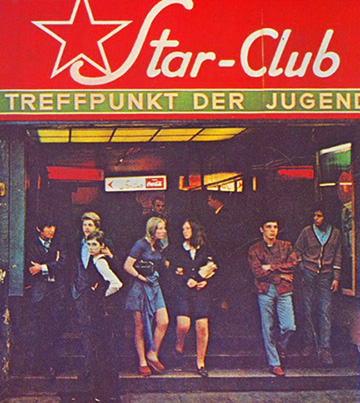
One story about Earth involved them being hired to play at an upscale club in Manchester and while the group was setting up they were told the audience was looking forward to a performance of the band's latest single. They were initially confused about this request as they had not made any records but soon realized the club's management had mistaken them for another band with a similar name who were currently in the charts. As can be imagined, Earth's performance at the club that night was not well received and they were promptly banned from ever appearing there again!
To avoid future confusion with any other band, it was decided that a new group name should be selected. Geezer Butler came up with "Black Sabbath" after seeing an advertisement for a horror film of that name and it was agreed by all to be a good choice. This controversial name inspired another West Midlands hard rock line-up to go by the name of Judas Priest.
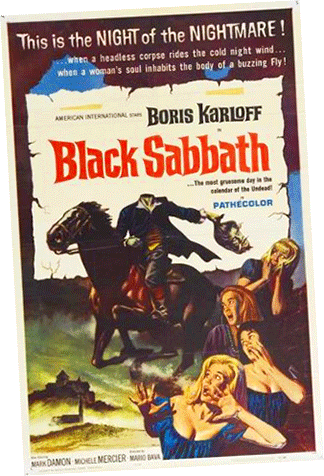
The group were performing much original material by this time - most of it evolving from extended guitar or bass riffs supplied by Tony Iommi or Geezer Butler whose interest in the occult inspired some of the lyrics. This, along with Ozzy Osbourne's ever-more-manic and foreboding vocals and Bill Ward's well-placed drumming, combined to form a unique sound that fitted well with their new name and dark image. It was a sound that would soon have far-reaching influence on many other bands for decades to come.
"We never took the black magic stuff seriously"
The band's controversial name naturally attracted attention though not all of it was welcome. Black Sabbath had a request from a group of "Satanists" who wanted them to perform at their annual ceremony held at Stonehenge. The band politely refused the request but were later informed that the cult leader had placed a "hex" on them. Fearing for their lives, Ozzy Osbourne asked his father to make a metal cross for each band member and these were worn around their necks as protection.
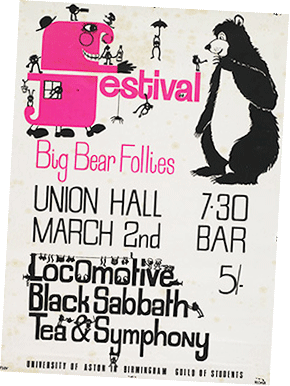
The crosses soon became a well known symbol for Black Sabbath although the band always denied having any religious associations or an active involvement in the occult - Tony Iommi explaining they were "just a band that played heavy music". Geezer Butler was perhaps the only band member to take a serious interest in the dark arts although certain visions he experienced may have been chemically induced! Years later, Ozzy Osbourne said; "I can honestly say we never took the black magic stuff seriously. We just liked how theatrical it was."
While Black Sabbath were gaining recognition and a larger audience, there was little money available and the group members sometimes had to rely on their parents or friends for support. The band had purchased an old police van as transportation for themselves and their equipment and would often cause gasps and stares from passers-by when they emerged from the vehicle, all dressed in black with crosses round their necks and long hair that barely revealed their faces.
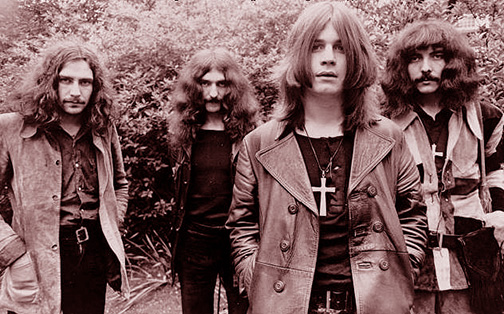
Armed with a rough demo tape, Jim Simpson tried to get London record companies interested in Black Sabbath but to no avail. Finally in late 1969, successful record producer and promoter Tony Hall from Philips Records went to a Black Sabbath performance and was impressed enough to arrange for them to go to London and make some recordings. One of the tracks recorded by the band at Regent Sound Studios was their cover of a song titled 'Evil Woman' that was issued as a single on the Fontana Records label in January of 1970.
Black Sabbath were then provided with one day of studio time in which to record an album of original material - most of which had been composed and rehearsed during the previous six months.
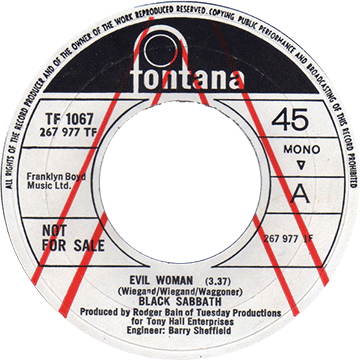
Ozzy Osbourne recalled; "We just set up our gear and played what amounted to a live set without an audience. Once we'd finished, we spent a couple of hours double-tracking some of the guitars and vocals and that was that. It can't have taken any longer than 12 hours in total." Tony Iommi said; "We received 100 pounds each for our efforts which to us was a lot of money but of course we would gladly have done it for free".
The next day, Black Sabbath left for some bookings in Switzerland leaving Roger Bain and Tony Hall to mix the recorded tracks and arrange the LP cover artwork. Unfortunately, few record companies were enthusiastic about the resulting self-titled album so it took a lot of effort on Jim Simpson's part before he found one that would agree to release it.
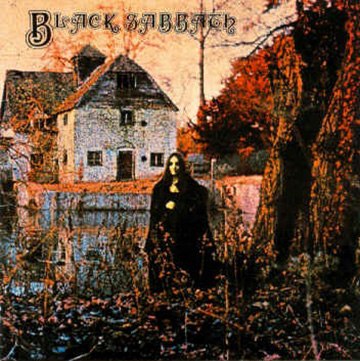
The first track on the album was a doom-laden number entitled 'Black Sabbath' that was introduced by sounds of a thunderstorm and the distant tolling of a church bell. The ambience is suddenly shattered by an incredibly powerful bass and guitar riff, repeated in unison over a wonderful background of drum dynamics.
Ozzy Osbourne's menacing vocals ranged from a dark murmer to screaming bursts of emotion throughout the recording. No one had heard anything like it. The other tracks on the album displayed a similar quality with each group member sharing equal prominence on the recordings.
None of the band members had seen or heard the finished album until they were presented with their own copies of it. They were particularly amazed by the album artwork and sound effects added to the recording of 'Black Sabbath' but after Ozzy played the record for the first time to his parents, his father said; "Are you sure it was only beer you were drinking when you made that?"
On February 6th 1970, just a week before the release of the album, Black Sabbath performed at the legendary and influential "Mothers" club in Birmingham - their first of several appearances there. The club was formerly Erdington's Carlton Ballroom where the Moody Blues had played regularly before making the big time. Tony's school friend Albert Chapman who was roadie for the group joined them full-time as their tour manager.
"I am Iron Man"
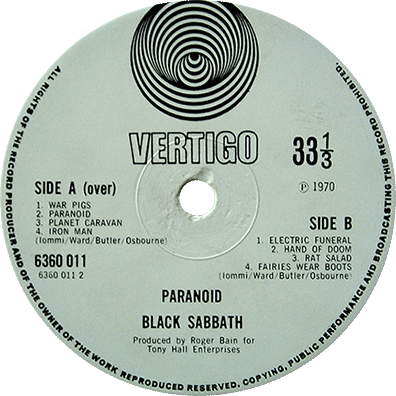
No one, including the group themselves, expected the Black Sabbath album to be a big seller as they were still at this time very much an "underground" attraction. Amazingly, the LP record that was issued on the new Vertigo Records label, climbed to the Number 8 position in the UK album chart and also got to Number 23 in the U.S.A. The band went from earning 500 pounds a night to more than 2,000 pounds a gig!
This success was consolidated later that year when Black Sabbath had their second album release that became an instant classic. It included a surprise hit single titled 'Paranoid' that got to Number 4 in the UK during August of 1970, remaining in the charts for 18 weeks. Having such influential tracks as 'War Pigs' and 'Iron Man', the Paranoid album became known as a "template" for other heavy metal bands to follow in decades to come.
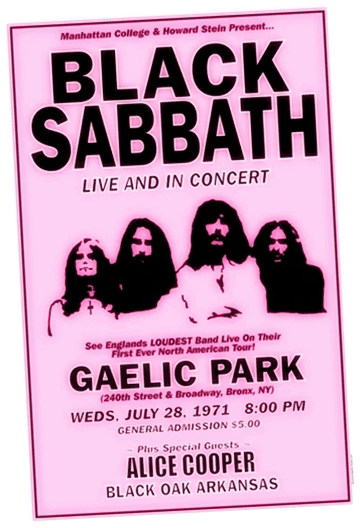
Before the end of 1970, Jim Simpson was unfairly dismissed from managing Black Sabbath. He tried suing the band and their new management, but the case dragged on for years and most of the eventual settlement went towards paying lawyers and court costs. Black Sabbath later came under the control of the formidable Don Arden who also managed the successful Brum groups The Electric Light Orchestra (ELO), and Wizzard.
Black Sabbath were sent over to the United States for a tour but found the American audience lethargic when they played at a show in New York. The band put in a typically energetic and loud performance but got little reaction from the audience. Out of frustration, Bill Ward picked up his bass drum and threw it into the watching crowd who then went wild in response. Black Sabbath ended up doing seven encores that night. By the time the band reached Los Angeles on the West Coast, Black Sabbath had become a big success in America.
Black Sabbath would go on to spend the next several years touring the world and recording top-selling albums but the success did not come without cost. On-going problems with management along with alcohol and drug abuse would eventually take its toll on the group. They are however, recognized by many as the prototype "heavy metal" band.
Ozzy Osbourne was fired from Black Sabbath in 1979 and replaced by a succession of well known singers that included American vocalist Ronnie James Dio and Deep Purple's Ian Gillan. Founding member Bill Ward was forced to leave Black Sabbath a number of times due to ill health and replacements have included legendary drummers Cozy Powell (see Young Blood) and Birmingham's own Bev Bevan (formerly of The Move and ELO).
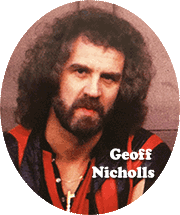
Keyboardist Geoff Nicholls from the Brum group "Quartz" who started out in Johnny Neal's Starliners and World Of Oz was also part of the Black Sabbath line-up for many years. Geoff was invited to join the band following his contributions to the successful "Heaven and Hell" album in 1980 during which time Ozzy was replaced by Ronnie James Dio. Geoff Nicholls passed away in January 2017 (see BrumBeat Geoff Nicholls feature).
Other musicians from the West Midlands who went on to play in the Black Sabbath line-up include Idle Race and Savoy Brown vocalist Dave Walker who started out in Walsall's 1960s group The Redcaps. Dave was also for a short time in the world-famous Fleetwood Mac. Another Deep Purple vocalist/bassist Glenn Hughes who began his music career in Finder's Keepers and Trapeze also did a tour of duty with Black Sabbath. Brum vocalist Tony Martin has also recorded and toured with the group.
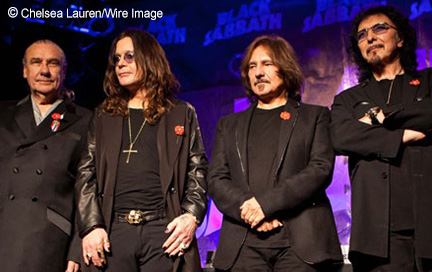
Tony Iommi continues to be a major inspiration for millions of young guitarists all over the world. These days, along with Geezer Butler, he leads the present line-up of Black Sabbath (or "Heaven and Hell"), a band that still manages to fill stadiums whenever they go on tour. A recent battle with cancer forced Tony into semi-retirement although his love of performing and making new music continues to this day.
Despite disagreements made public by band members in recent years, many fans still hope the original line-up of Black Sabbath with Ozzy, Tony, Geezer, and drummer Bill Ward will one day re-form. Black Sabbath were inducted into the famous "Rock & Roll Hall of Fame" in 2006.
"The Prince of Darkness"
In 1982 after a divorce from his first wife, Ozzy Osbourne married Sharon Arden - daughter of notorious pop music manager Don Arden. Sharon quite possibly saved Ozzy's life in getting him sober and away from self-destructing alcohol and drug use. Under her firm and expert guidance, Ozzy became hugely successful as a solo artist and has recorded multi-million selling albums and sold-out concert tours backed by his own band initially named "The Blizzard of Ozz" featuring legendary American guitarist Randy Rhoads who had previously played in "Quiet Riot".
The massive success of the North American "Ozzfest" heavy-metal festivals masterminded by Sharon Osbourne and starring Ozzy and his band (of course) raised his profile considerably during the 1990s. These events also resulted in re-unions on stage of the original Black Sabbath line-up featuring Ozzy Osbourne, Tony Iommi, Geezer Butler, and Bill Ward.
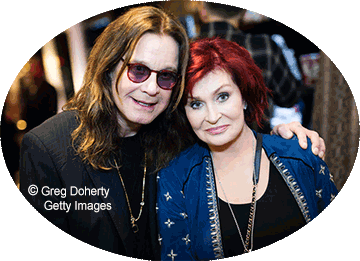
Ozzy Osbourne re-invented himself to become the "Prince of Darkness" as he is popularly known amongst many heavy metal fans. His remarkably successful career as a solo performing artist has exposed him to a much larger audience than was possible while a member of Black Sabbath. While some incidents such as biting the head off a live bat and urinating in the most public of places may have caused some concern, his stumbling Brummie accent has become world famous and loved by countless fans.
During 2001, Ozzy and Sharon became the subject of a ground-breaking American "reality" TV show titled "The Osbournes" in which their day-to-day family life was recorded and shown on the influential MTV network. Incredibly, the show gained a massive audience, resulting in Ozzy Osbourne and his family becoming major stars on television. Not bad for someone who once shared the bedroom of a small house in Aston with five brothers and sisters!
Copyright © John R Woodhouse
Thanks to Jeff Hibbard, Roger Hope, Neil Marshall, and Neil Cassin for assistance in preparing this Black Sabbath biography. Some selected quotes are from the official autobiographies of Tony Iommi and Ozzy Osbourne.
Black Sabbath 1960s Record Releases
Singles:
Albums:
Some official Black Sabbath related websites are listed below:
Black Sabbath: www.blacksabbath.com
Ozzy Osbourne: www.ozzy.com
Tony Iommi: www.iommi.com
Bill Ward: www.billward.com
Geezer Butler: www.geezerbutler.com
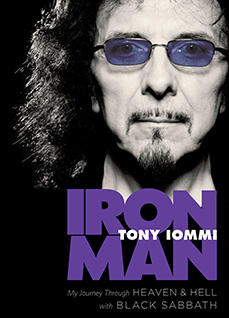
Tony Iommi's official autobiography was published in 2011. The book title is; 'Iron Man - My Journey Through Heaven & Hell with Black Sabbath'. Written by Tony Iommi with assistance from T.J. Lammers (Da Capo Press ISBN: 978-0-306-81955-1).
This book is well recommended to fans of Black Sabbath and is a fantastic read full of great stories and details in the life of one of the most influential guitarists of all time. Available in good book shops and on line. Check out Tony Iommi's official web site for more details at: www.iommi.com
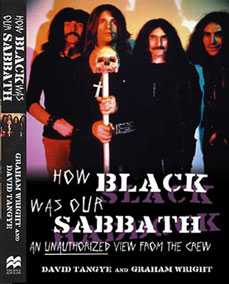
To read more about Black Sabbath's early years, the book "HOW BLACK WAS OUR SABBATH" ISBN 0330411942 written by David Tangye and Graham Wright is highly recommended.
For more information about How Black Was Our Sabbath book, visit their web site at www.blacksabbath.co.uk
The web page of Jeff Hibbard who was guitarist in Ozzy's early group "THE APPROACH" can be seen by clicking HERE
If you would like to contribute to this page, please e-mail john@brumbeat.net